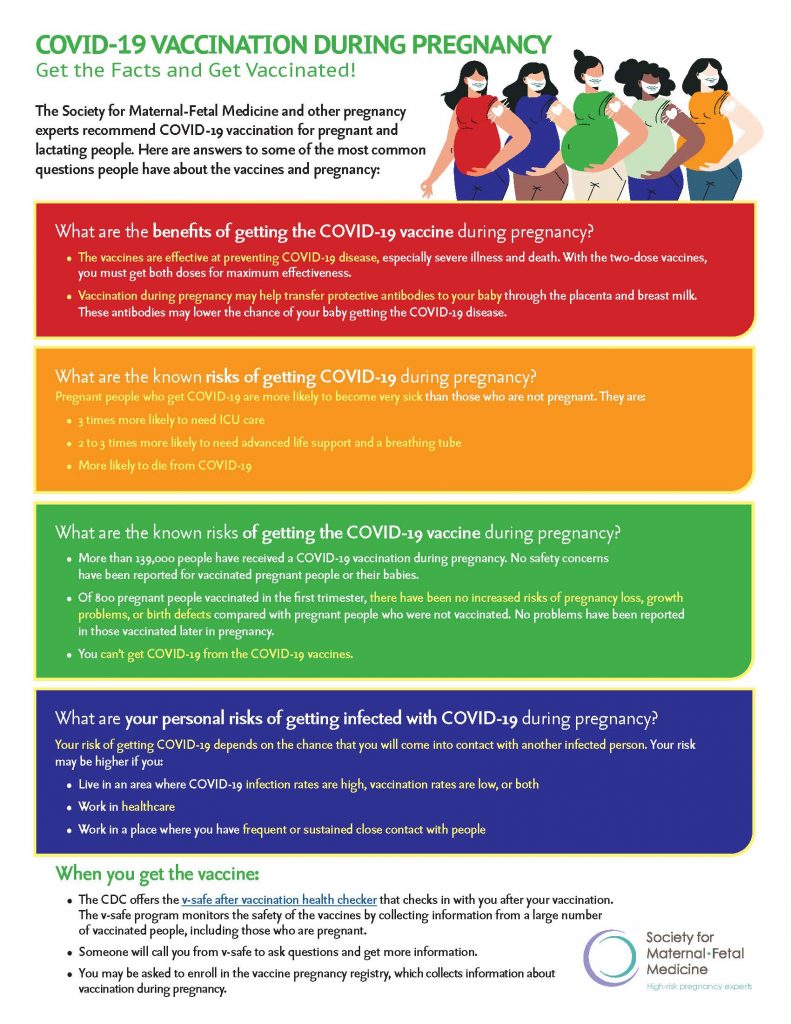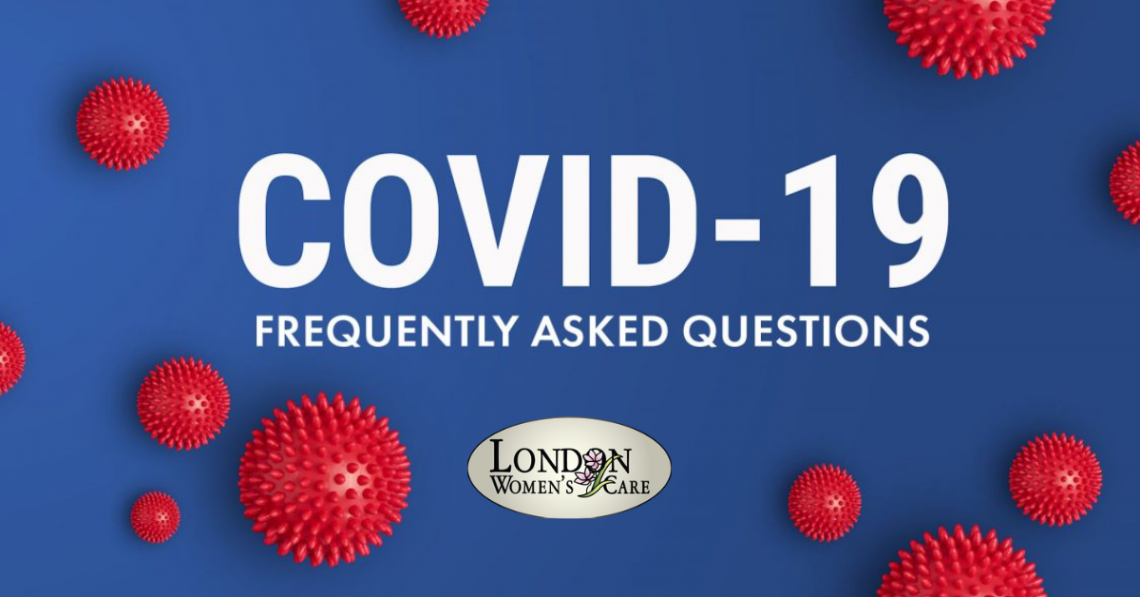
Do I have to wear a mask when I come to the office?
Yes, you do. Even though many of our providers and staff members are fully vaccinated and we know that many of you are as well, we are following CDC guidance. The CDC recommends that even fully vaccinated individuals remain masked when providing or receiving patient care in a healthcare setting. As a larger portion of the population becomes vaccinated, we all look forward to the day that we can reduce the current rules about mask-wearing in the physician’s office and hospital setting.
US Food and Drug Administration (FDA) has issued an emergency use authorization (EUA) for the following vaccines:
- Pfizer-BioNTech
- mRNA vaccine approved for individuals age 12 and over. This is a 2-dose regimen with doses given 21 days apart. The individual is considered fully vaccinated 2 weeks after the second dose. There is no indication that this technology is harmful to the pregnant or lactating mother or her fetus at this time.
- Moderna
- mRNA vaccine approved for individuals age 18 and over. This is a 2-dose regimen with doses given 28 days apart. The individual is considered fully vaccinated 2 weeks after the second dose. There is no indication that this technology is harmful to the pregnant or lactating mother or her fetus at this time.
- Janssen Biotech (Johnson & Johnson or J&J)
- The vaccine uses a vector or a “carrier” called an adenovirus. An adenovirus by itself can cause symptoms of a common cold. The strain of adenovirus used in this particular vaccine will not make a human being ill. This technology of vaccine creation has been around since the 1970s. Many of the influenza vaccines use this technology.
- It is a single dose for individuals age 18 and older. The individual is considered fully vaccinated 2 weeks after the second dose.
- The J&J vaccine distribution was paused briefly in the US in April 2021 when several reports of blood clots in individuals were identified after receiving the J&J COVID-19 vaccine. The CDC’s Advisory Committee on Immunization Practices, the FDA, and CDC conducted extensive research into this situation and recommended that J&J vaccine distribution should be resumed in the US. The FDA stated that available data show that the vaccine’s known and potential benefits outweigh the risks associated with the vaccine. Notice of increased risk of clots for women ages 18 to 48 is now listed on the vaccine. The FDA continues to authorize the vaccine for pregnant women. If they have a pre-existing risk of clots prior to the pregnancy, this should be addressed with their healthcare provider.
Are all the vaccines effective?
Yes, all three brands of the vaccine are highly effective.
- Pfizer – has been shown to be 95% effective at preventing laboratory-confirmed COVID-19.
- Moderna – is about 94.1% effective in preventing laboratory-confirmed COVID-19.
- J&J – the vaccine has been shown to be 76.7% effective in preventing severe/critical COVID-19 illness and 93.1% effective at preventing hospitalizations 14 days following vaccination.
Are the viral variants affecting the effectiveness of the vaccine?
We are learning more about this every day. Many of the variants are more contagious, making it easier to catch them. The vaccines appear to be highly effective against the variants we currently see; however, as we learn more about these variants, booster vaccine doses may be recommended annually or every so often to address the newer variants. This is much like the slight adjustments we see to the flu vaccine each year.
What are the side effects of the vaccine?
The side effects of this vaccine include pain, redness, or swelling in the arm where you got the shot. You may note tiredness, headache, muscle pain, chills, fever, and nausea throughout the rest of your body. Many patients do not have not side effects at all. Some who do have side effects note that the symptoms are more notable after the second dose of vaccine in the two-dose regimens (Pfizer and Moderna). Pregnant women are encouraged to use acetaminophen should they develop a fever after a vaccine dose.
Does London Women’s Care recommend pregnant and breastfeeding women get vaccinated?
The Centers for Disease Control and Prevention (CDC) states that pregnant persons are eligible for and can receive a COVID-19 vaccine. The American College of Obstetrics and Gynecology (ACOG) and the Society for Maternal-Fetal Medicine (SMFM) recommend that COVID-19 vaccines should not be withheld from pregnant patients. None of the current brands of COVID vaccine are considered contraindicated for pregnant women. The COVID-19 vaccine should be offered to lactating individuals similar to non-lactating individuals. None of the current brands of COVID vaccine are considered contraindicated for breastfeeding women.
Click here to download the COVID-19 Vaccination During Pregnancy Guide (PDF)
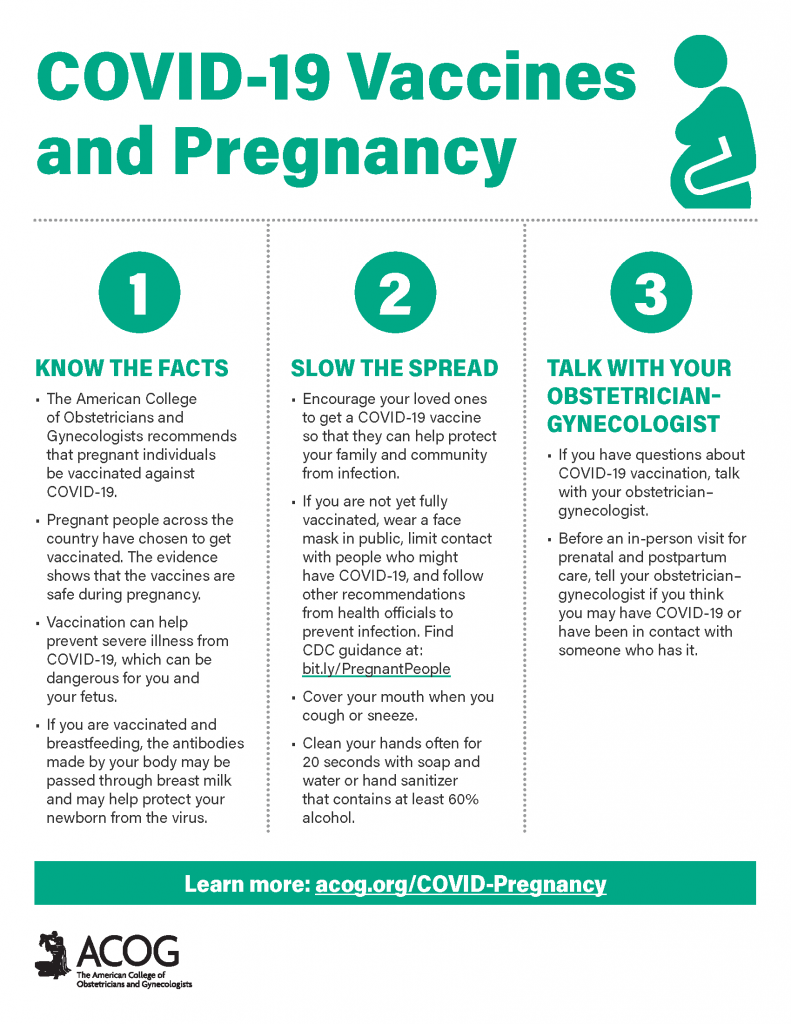
Click here to download the COVID-19 Pregnancy Infograpic (PDF)
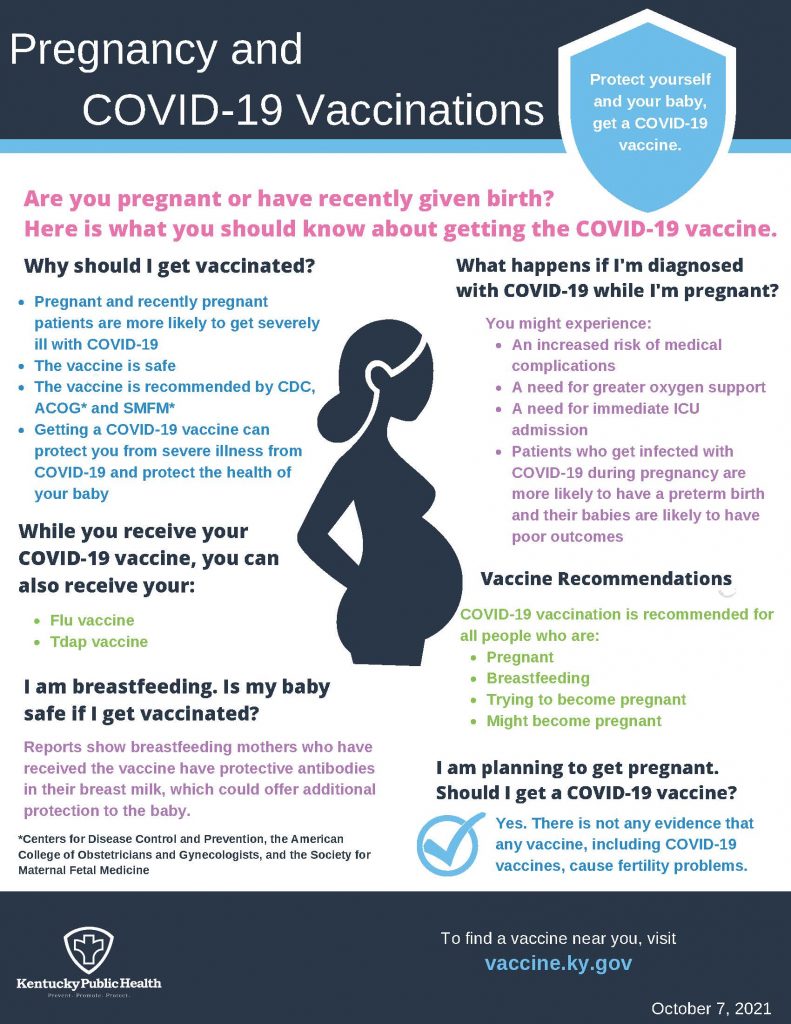
Click here to download the Pregnancy and COVID-19 Vaccinations Infosheet (PDF)
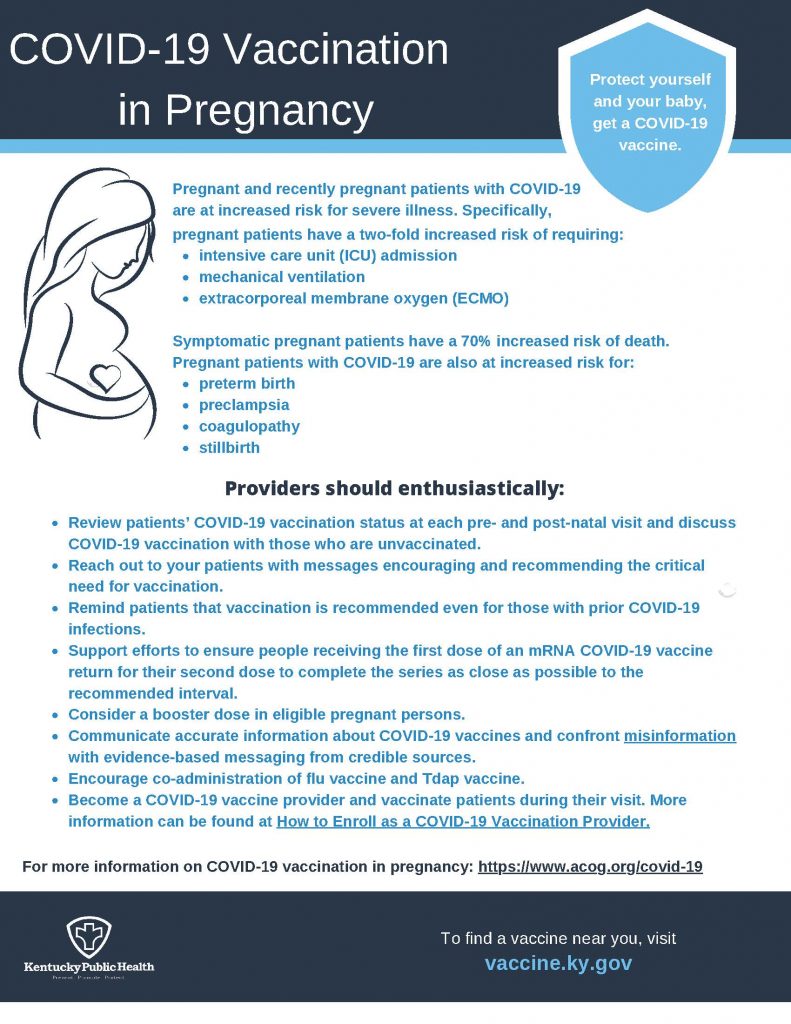
Click here to download the COVID-19 Vaccination in Pregnancy Infosheet (PDF)
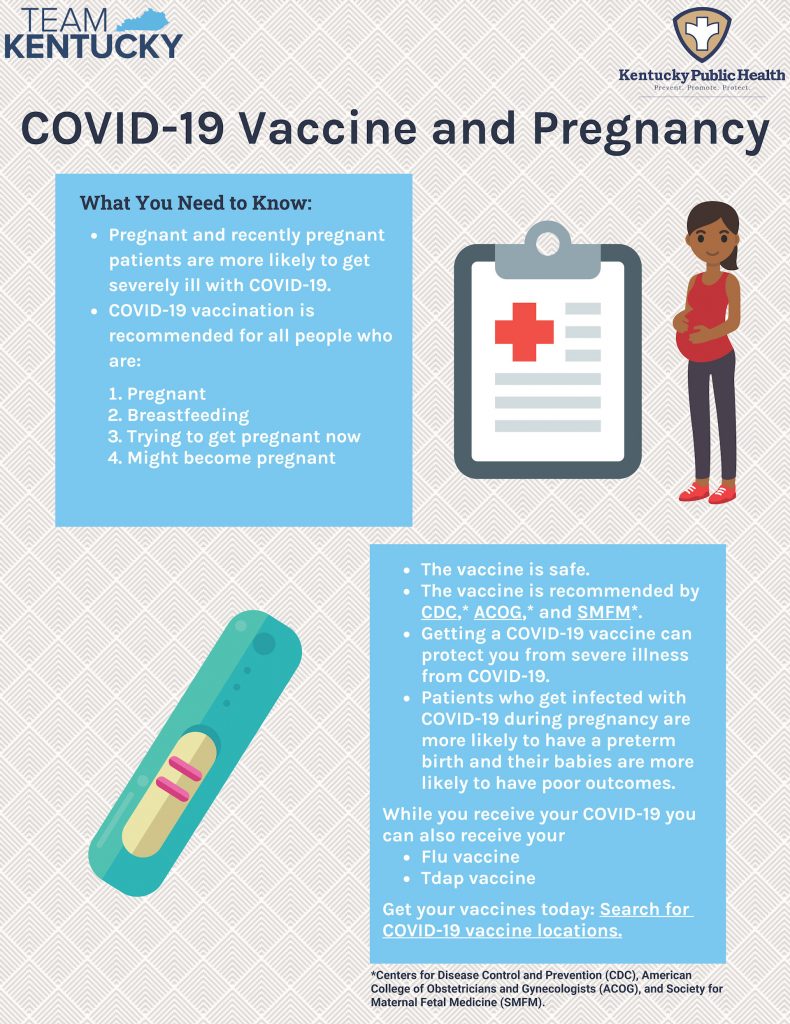
Click here to download the COVID-19 Vaccine and Pregnancy Infographic (PDF)
If I am trying to get pregnant, should I still get vaccinated?
Pregnancy testing should not be a requirement before receiving the vaccine.
What are the benefits of getting the COVID-19 vaccine during pregnancy?
The vaccines are effective at preventing COVID-19 disease, especially severe illness and death. With the two-dose vaccines, you must get both doses for maximum effectiveness. Vaccinations during pregnancy may help transfer protective antibodies to your baby through the placenta and breast milk. These antibodies may lower the chance of your baby getting the COVID-19 disease.
Are there any increased risks to me or my baby if I contract COVID-19 in pregnancy?
Pregnant individuals with COVID-19 are at an increased risk for severe illness for COVID-19—including illness that results in ICU admission, mechanical ventilation, and death—compared with non-pregnant individuals. Additionally, pregnant individuals with COVID-19 are at increased risk for preterm birth.
What are the known risks of getting the COVID-19 vaccine during pregnancy?
More than 139,000 people have received the COVID-19 vaccination during pregnancy. No safety concerns have been reported for vaccinated pregnant people or their babies. Of 800 people vaccinated in the first trimester, there have been no increased risks of pregnancy loss, growth problems, or birth defects compared with pregnant people who were not vaccinated. No problems have been reported in those vaccinated later in pregnancy.
You cannot get COVID-19 from the COVID-19 vaccine.
Can pregnant women pass COVID-19 to the baby?
Pregnant women who contract COVID-19 in pregnancy in the third trimester are unlikely to pass the infection on to their newborns.
Does breastfeeding transmit COVID-19 to the baby?
Current evidence suggests that breast milk is unlikely to spread the virus to the baby.
Does a COVID-19 vaccinated mother offer any protection from COVID to her baby by breastfeeding?
Two early studies from Israel indicate that COVID-19 antibodies pass from mothers to their infants in breast milk for 6 weeks after vaccination. In this study, no infants who were breastfed by their COVID-vaccinated mothers had evidence of infection. This is limited but encouraging information about the protection offered to the newborn by a COVID-vaccinated mother who elects to breastfeed the newborn.
Will the COVID-19 vaccine hurt my unborn or breastfed baby?
None of the COVID-19 vaccines available in the US are believed to cause harm to the unborn or breastfed baby.
Will the COVID-19 vaccine impact my future fertility?
There is no evidence at this point that suggests that any of the FDA-approved vaccines will impact your future fertility.
Must I get a clearance from my physician to get a COVID-19 vaccine?
While you are always welcome to speak to your provider about any concerns you may have in pregnancy or breastfeeding, you are not required to have a conversation with your provider or a note from your provider to get a COVID-19 vaccine.
Is there a cost to the COVID-19 vaccine?
Currently, the US government is providing the COVID-19 vaccines at no cost to individuals. Many sites will collect your insurance information to recoup some of the vaccine cost, but you will not be charged directly for the vaccine nor is insurance required to get the vaccine.
What are some of the benefits of being fully vaccinated?
- The CDC has recommended that fully vaccinated individuals can be social distanced outdoors without masks. Please note local laws may apply. Masks are recommended to be worn indoors due to an increase in cases in Kentucky.
If you should develop symptoms after exposure, you should be tested at that time.
- You can travel domestically without quarantining or COVID testing if you are asymptomatic.
What If I decline the COVID-19 vaccine? You will be supported in your decision not to receive the vaccine. Please continue to practice social distancing and wear a mask.
Can I bring a visitor to my OB appointment at London Women’s Care?
At this time, you can bring one masked visitor over the age of 18 to select OB ultrasound visits. These include your ultrasounds such as the second-trimester anatomy scan, and a third-trimester ultrasound if one is deemed necessary by your provider.
Can I make a video of my ultrasound?
During the pandemic, the sonographer will help to provide you with short film clips during the ultrasound that you may take home to share with family and friends.
Can I bring a visitor for a gynecology exam?
We do not recommend bringing a visitor for a gynecology exam unless you discuss serious test results or go over consents for surgery. If you are having a procedure in the office, you are welcome to bring a support person who may sit in the car and help you in and out of the office as needed. If you need special support to come in and out of the office, such as maneuvering a wheelchair, you are welcome to have a masked support person or aide with you.
My child is a minor and seeing the doctor. May I join her?
Yes, unemancipated minors may have a parent or legal guardian accompany them to the visit. The visitor must remain masked throughout the visit.
Can I bring my children with me to my postpartum visit?
During the pandemic, we prefer that you leave your children at home during your postpartum visit. However, if you have no other option, we ask that you advise the office in advance of the day of your visit to see if special accommodations can be made. On the day of the visit, call the office when you are in the parking lot and the office will let you know when to come in so that you can go directly into the office without waiting. Please bring a stroller or carrier for an infant or toddler who is accompanying you.
Can I ever be unmasked in a non-healthcare setting?
If you are fully vaccinated, you can be unmasked outdoors. Local ordinances and private business rules will still apply and so some companies may require masking to enter. Additionally, if fully vaccinated, you may travel domestically without testing for COVID or quarantining. International destinations may have separate rules and we encourage you to check on them before traveling.
What We’re Doing to Protect You
Caring for you means doing our part to keep you safe during your office visit.
- Screening all patients, providers, visitors, and employees before they come into our locations. Screening of patients and visitors is now part of OSHA’s healthcare temporary standard to maintain a safe environment.
- All patients, visitors, and staff are expected to wear face coverings. PPE will be used and properly disposed of in higher-risk interactions.
- We’re following strict processes to sanitize our offices regularly.
- London Women’s Care staff members are receiving instruction and ongoing updates about COVID-19, hand hygiene, and other safety measures to decrease the likelihood of contracting or transmitting the infection.
London Women’s Care is Offering COVID-19 Testing!
London Women’s Care offers COVID-19 testing at select locations. There are many reasons to get tested for COVID-19. You may be experiencing symptoms such as loss of smell or taste, fever, cough, or diarrhea. Or you might have been exposed to someone who was a confirmed case. London Women’s Care is here to help ensure our patients have access to COVID-19 testing.
Who is eligible to get tested?
- Asymptomatic patients with known or suspected exposure to a person with a confirmed case of COVID-19 within 14 days
- Patients presenting with symptoms of upper and/or lower respiratory tract infection
- Healthcare workers
- Asymptomatic patients who need proof of a negative result for work, school or travel
The following tests will be performed at select locations
- SARS-CoV-2
- SARS-CoV-2
Please contact your provider’s office if you have questions about COVID-19 testing.
Helpful Links
We encourage you to keep yourself updated on information about coronavirus by looking at the following websites:
- World Health Organization
- Centers for Disease Control and Prevention (CDC)
- Kentucky Department for Public Health

